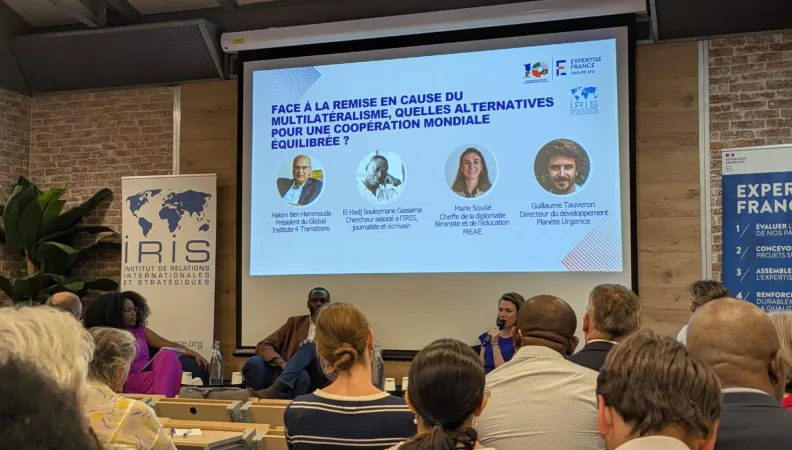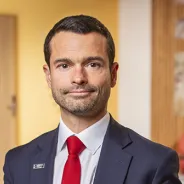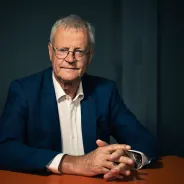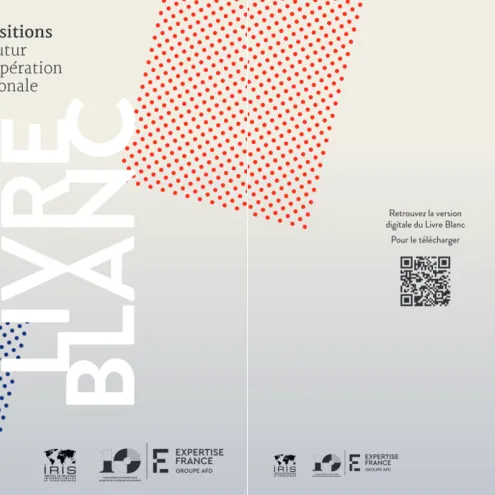Share the page
With IRIS, a conference to renew the foundations of international cooperation
Published on

With the world experiencing geopolitical reconfigurations and a weakening of multilateralism, Expertise France and IRIS organised a conference-debate to present the co-authored White Paper “10 Proposals for the Future of International Cooperation”. Through a series of discussions, the event shed light on the conditions for a credible and assumed reform of cooperation.
The conference organised at IRIS on 24 June, entitled “As multilateralism is called into question, what are the alternatives for balanced international cooperation?”, aimed to present the White Paper and broaden the debate on certain issues, such as the climate and women’s rights, as part of our common efforts to renew the paradigms of cooperation by linking strategic thinking and operational realities in an unstable geopolitical context.
It should be noted that this White Paper, produced through collective work between expert practitioners and researchers, questions existing models and calls for building more balanced and inclusive cooperation, geared towards national trajectories, in support of clear, effective and sovereign public policies.
An overall reflection on the dialogue and positioning between historical cooperation operators and beneficiary partners
Pascal Boniface, Director of IRIS, believes that what is required above all is to face up to the fact that the world is experiencing upheavals. The partnership between IRIS and Expertise France reflects a move beyond the silos between public action and strategic research. It emphasises the need for cooperation based on assumed and complementary interests, to ensure that other powers with less concern for international law do not step into the breach opened up by multilateralism.
Jérémie Pellet, Chief Executive Officer of Expertise France, highlighted the growing importance of the link between research and action to give depth to cooperation. He advocates for a renewed approach to the vocabulary employed: “To continue to use the term ‘developing countries’ is problematic,” he said, pointing out that Expertise France also cooperates with “developed” countries, such as Australia and Japan. He believes that cooperation is in everyone’s interest, but that it needs to be clearly affirmed in discourses and methods.
Adapting to the new paradigms for more responsive and effective cooperation: considering partnerships beyond historical legacy
An analysis of the BRICS+ dynamics, which is extensively developed in the White Paper, helps explain why countries like Brazil and India take an independent stance, often in a logic of multi-alignment. During a panel discussion, El Hadj Souleymane Gassama, a journalist, writer and Doctor of Sociology, pointed out that this de-Westernisation should not be understood as a dogmatic rejection of Europe, but as an effort to rebalance power relations. He calls for a more nuanced analysis of the geopolitical repositioning. For example, Russia is not a new actor in Africa: it is continuing a history of cooperation that dates back to the Soviet era. However, he pointed out that perceptions remain marked by colonialism and that the mistrust towards Western initiatives, even if they have been renewed, persists. The very concept of the “Global South” is questionable and is used for geopolitical purposes, with no structural justification.
Feminist diplomacy, climate, civil society: priorities for action rooted in regions
One of the lessons from these fruitful discussions is the importance of the “bottom-up” approach to cooperation, driven by civil society stakeholders and decentralised administrations. Feminist diplomacy, which is supported by Marie Soulié, Head of the “Feminist Diplomacy” Mission at the Ministry for Europe and Foreign Affairs, was initiated in France in 2019 and is outlined through the three lines of action: rights, representation and access to resources. It is directly reflected in the vision that promotes a structural and partnership approach, “based on listening to needs and the recognition of reciprocity in commitments.”
Guillaume Tauveron, Development Director at the NGO Planète Urgence, emphasised the importance of a systemic regional approach, pointing out that most of the biodiversity hotspots are in countries of the Global South. This notion is, moreover, an integral part of the White Paper, which calls for the need to break away from the traditional bilateral logics and develop shared solutions, involving local communities as co-builders, and not as passive beneficiaries.He cautioned against operations with no consultation, which can fuel permanent mistrust. He said that cooperation needed to be translated into capacity building and not substitution.
Towards a new grammar of international solidarity
The discussions also focused on the imaginaries of cooperation. El Hadj Souleymane Gassama spoke out against the deep-rooted idea that Western countries alone have the know-how and legitimacy for development.
Hakim Ben Hammouda, Director of the Tunisian think tank Global Institute 4 Transitions, stressed the need to completely reconsider the issue of financing national social development programmes, especially in African countries faced with a combination of shocks (Covid, inflation, war in Ukraine, rise in interest rates). This approach fits in with the consideration in the White Paper of the transformation of modes of financing for cooperation, which need to further integrate the structural asymmetries of partner countries.
This conference highlighted the need for a conceptual, political and methodological reform of international cooperation. While there is a desire to rebalance relations, it needs to translate into concrete changes in the way in which projects are designed, financed and implemented in order to integrate common interests, based on complementarity, free of any purely moral or disinterested discourse.
But there is also a need for this to be rooted in local realities, respecting existing dynamics, avoiding any neo-paternalism, and mobilising academic knowledge to enhance assessments and guide public policies on solid foundations.
“We’ve decided to seize this moment to take a new look at our activities, take some distance, and enhance our practices, by organising a dialogue with researchers who are specialists in our fields of operation and the priority geographical areas for our action […] offering an alternative to our own operational vision.”
- Chief Executive Officer of Expertise France

“Since the creation of IRIS, one of the constant concerns has been to connect the work on analysing and interpreting international relations of its researchers and cartographers with partners who drive operational initiatives and projects on a daily basis.”
- Director of IRIS

Expertise France-IRIS White Paper
Read the full publication co-authored with IRIS, entitled “10 Proposals for the Future of International Cooperation”
https://livreblanc-expertisefrance.fr/
